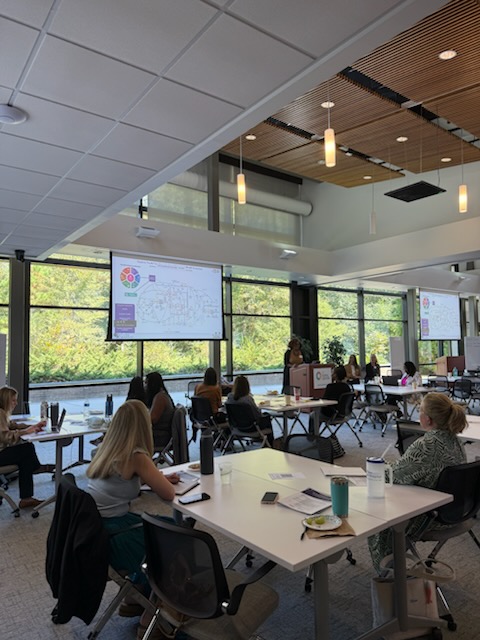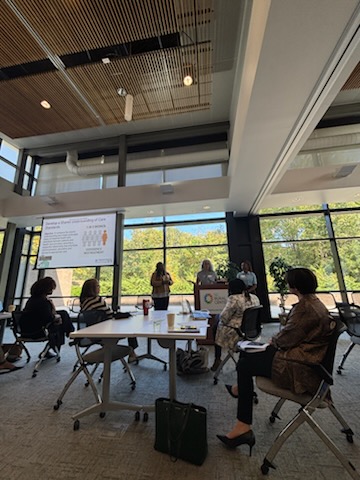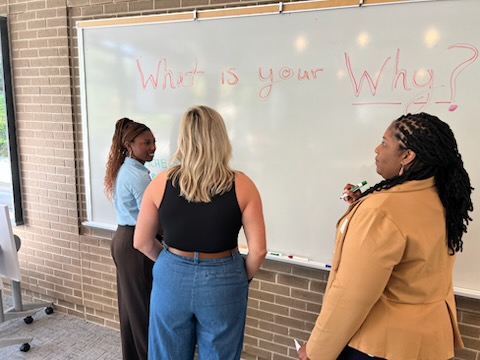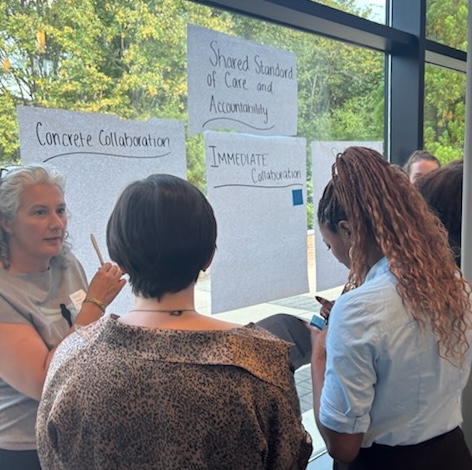
The Maternal and Child Health Equity Action Network (MCHEAN) held a community event, NC Rising: Maternal and Child Health Equity Convening, on September 24, 2025. Advocates, organizations, community leaders, and funders committed to improving the health and well-being of families gathered to connect during these challenging times.
The day focused on maternal and child health equity (MCH) included:
- Interactive sessions with community-led storytelling.
- Insights from the MCHEAN report, process, and approach.
- Cross-sector networking with fellow MCH equity advocates.
- Discussion about alignment between state maternal and child health priorities and the MCHEAN report.
For more information about the network’s history, read our blog post and view the complete “2024 Rising Together From Challenges to Change” report [PDF]. Learn more about the network and this inspiring event below!
Speaker Spotlights: Community-Based Equity in Action
The energy in the room was electric as maternal and child health equity advocates, many with direct lived experiences, came together to celebrate the release of the 2024 report. They shared stories, discussed challenges, built connections, and committed to continuing this vital work. Each speaker contributed an essential aspect of maternal and child health equity, leading to a rich discussion and many points of connection.


The event speakers included:
Tara Owens-Shuler, M.Ed., LCCE, CD (DONA) | Maternal Health Branch Head, NC DPH
Tara has more than 30 years of experience in maternal and infant health programs and training. She also works as a Lamaze Certified Childbirth Educator. The event speakers included:
Meredith Aulds, PhD | Perinatal Health Strategic Plan Coordinator, NC DPH
Meredith coordinates the Perinatal Health Strategic Plan and recently earned her PhD in Medical Anthropology from Purdue University. She is also a community health worker and birth doula, actively involved with nonprofits offering free doula services and serving on the board of the North Carolina Doula Organization.
Tomeka Isaac, MBA, MHRM, CAMS, PMH-C | Executive Director, Jace’s Journey
Tomeka co-founded Jace’s Journey, inspired by her personal experiences with loss and H.E.L.L.P. Syndrome. She advocates for maternal and fetal health and leads initiatives like Jace’s Embrace Boxes and the annual Jace’s Journey 5K.
Danielle Little, M.Ed. | Executive Director, THRIVE Family Health & Education Center
Danielle leads THRIVE in Durham, focusing on providing equitable support for families. She also directs the Pediatrics Supporting Parents initiative and has over a decade of experience as a doula and educator. Danielle holds degrees in Child Development, Health Education, and Adult Education.
Renee Clark, MSW | Telepsychiatry & Rural Hospital Specialist, NC Office of Rural Health
Renee has over ten years of experience in Federally Qualified Health Centers and now supports rural hospitals. She educates stakeholders about rural health and works collaboratively to enhance health care delivery in underserved areas.
Natasha Fuller, RN, BSN | Mother-Baby Home Visiting Program Manager, AppHealthCare
Natasha is a dedicated nurse with 19 years of experience supporting families through prenatal and postpartum care, specializing in holistic approaches to lactation, mental health, and pregnancy loss.
Karlene Cunningham, PhD | Assoc. Prof. Psychiatry & Behavioral Medicine & SHaRE2 Lab Director, East Carolina University
Karlene leads the SHaRE2 lab, focusing on reproductive justice and perinatal mental health. She oversees SEEDS ENC, a community doula program that has trained 33 doulas. Her research, FLOURISHING in ENC, combines AI to tackle bias in EHR-based prediction models for rural perinatal care.
Fireside Chat: Danielle (THRIVE) & Tomeka Isaac (Jace’s Journey)
One of the event’s highlights was a “fireside chat” between Danielle Little and Tomeka Isaac, where Tomeka shared her personal story of obstetric neglect and trauma, inspiring her to fight for health equity through her organization, Jace’s Journey.
Tomeka astutely pointed out, “We are told that every pregnancy is unique and different, and then we are all treated the same” when it comes to perinatal care. Her ability to transform her pain into specific acts of resistance and calls for change deeply inspired the attendees.
Heart-Centered Public Health Work: What Is Your Why?

The prompt “What is your ‘why’” served as an anchor throughout the event, grounding everyone in the shared experience of public health as heart-centered work. Speakers started their sessions by sharing their “why,” and attendees added their “why” to a collective board that captured the energy and essence of the incredible professionals present.
Some responses from speakers and MCHEAN planning committee members included:
“I do this work because families deserve care that is steady, whole, and rooted in respect. My own lived experiences taught me how deeply the whole family’s health shapes a child’s path, and how often systems overlook the very people they are meant to serve.”
“There is an old Greek proverb that reads, ‘A society grows great when old men plant trees whose shade they know they shall never sit in.’ I believe strongly in leaving the world a better place than you found it. I am here for a short time, so I will do my best to help while I am here.”
“When I was growing up and considering going into mental health, I was told that mental health was a luxury and not accessible to everyone. So I set out to change that narrative, with specific attention to the way mental health is addressed as people transition to parenthood and grow their families. I want to create a space where everyone benefits from inclusive psychological support.”
“I do this work because my daughter’s reproductive future is at risk today. Being healthy, carrying a pregnancy, and giving birth to a healthy baby should never be a privilege tied to the color of my skin or the size of my bank account. It should be a priceless choice—one that every parent and child deserves.”
“I do what I do because I believe that all families deserve a well-supported and dignified start to life together. We are fundamentally failing at providing that to mothers and families in this country, and they deserve better.”
Network & Coalition Building: Connecting the Dots in Community
At the end of the event, attendees took part in a closing activity that promoted new connections and reflected the four action plan items from the 2024 report. The goal was to identify ongoing work and find remaining gaps that could be filled through resources or connections among the attendees.

This heart-led work is essential for the health and well-being of everyone across North Carolina, and the MCHEAN planning committee agreed to use these responses to encourage actions that will strengthen the collective effort in the coming months. To go deeper and stay connected:
Additional Reading and Resources
- Hugh Chatham in Siler City (critical access hospital) that developed a rural residency
- NCDHHS Women, Infant, and Community Wellness Section: 2018-2020 NC Maternal Mortality Review Committee Report
- NCDHHS Women, Infant, and Community Wellness Section: 2022-2026 Perinatal Health Strategic Plan (also includes the 2022-2026 Mid-Plan Report)
- Piedmont Health Services Partnership to address maternal mortality
